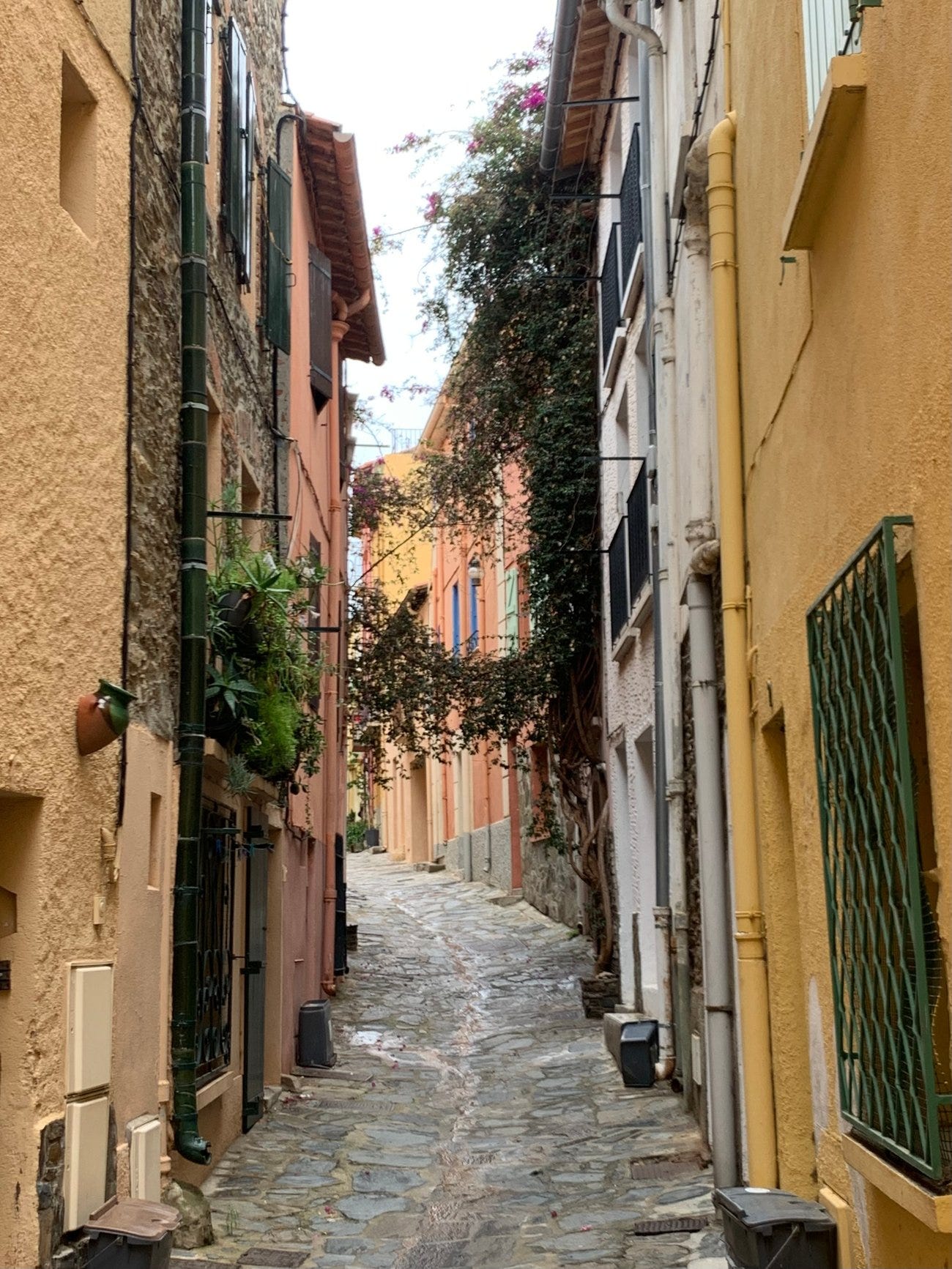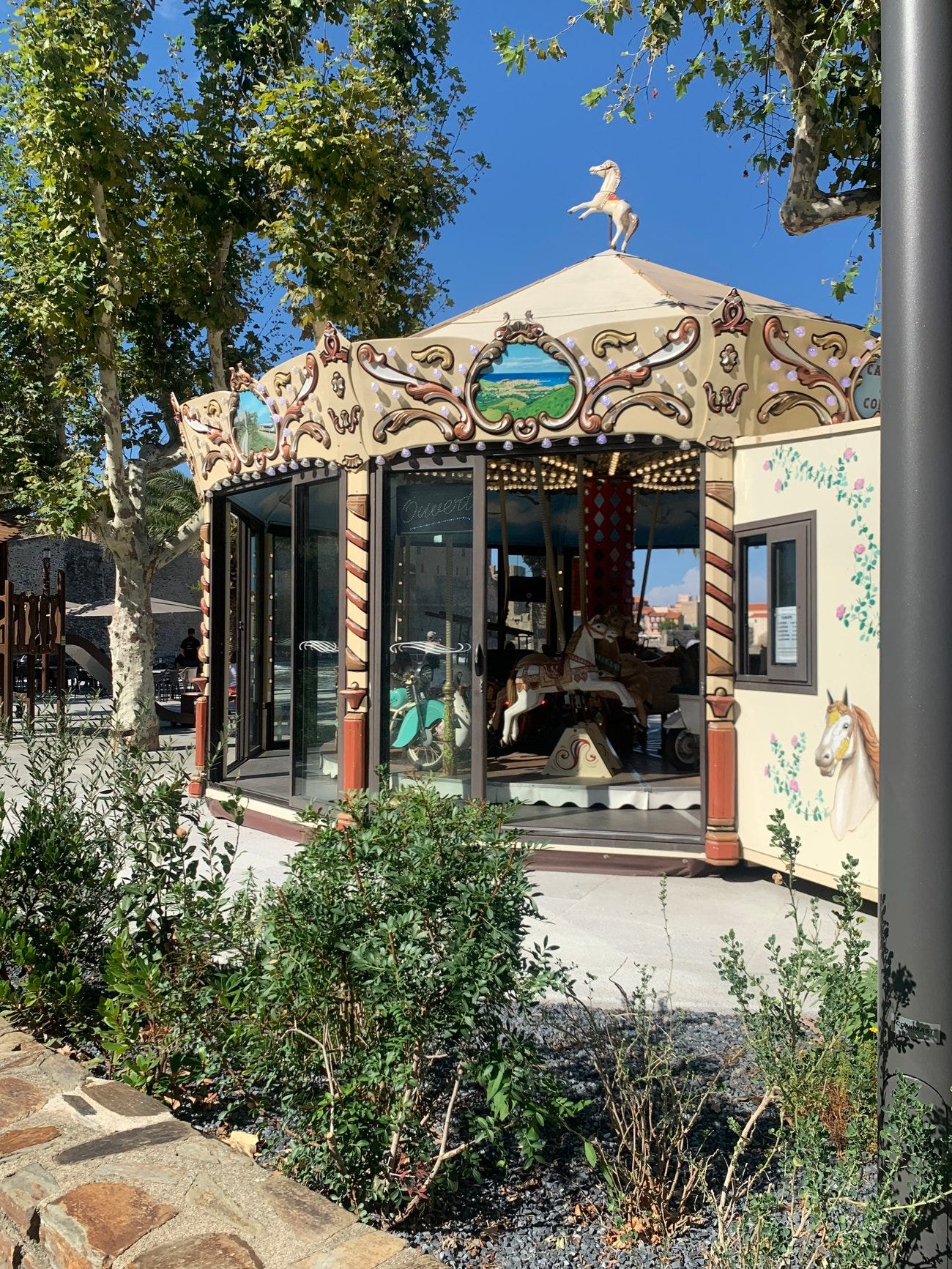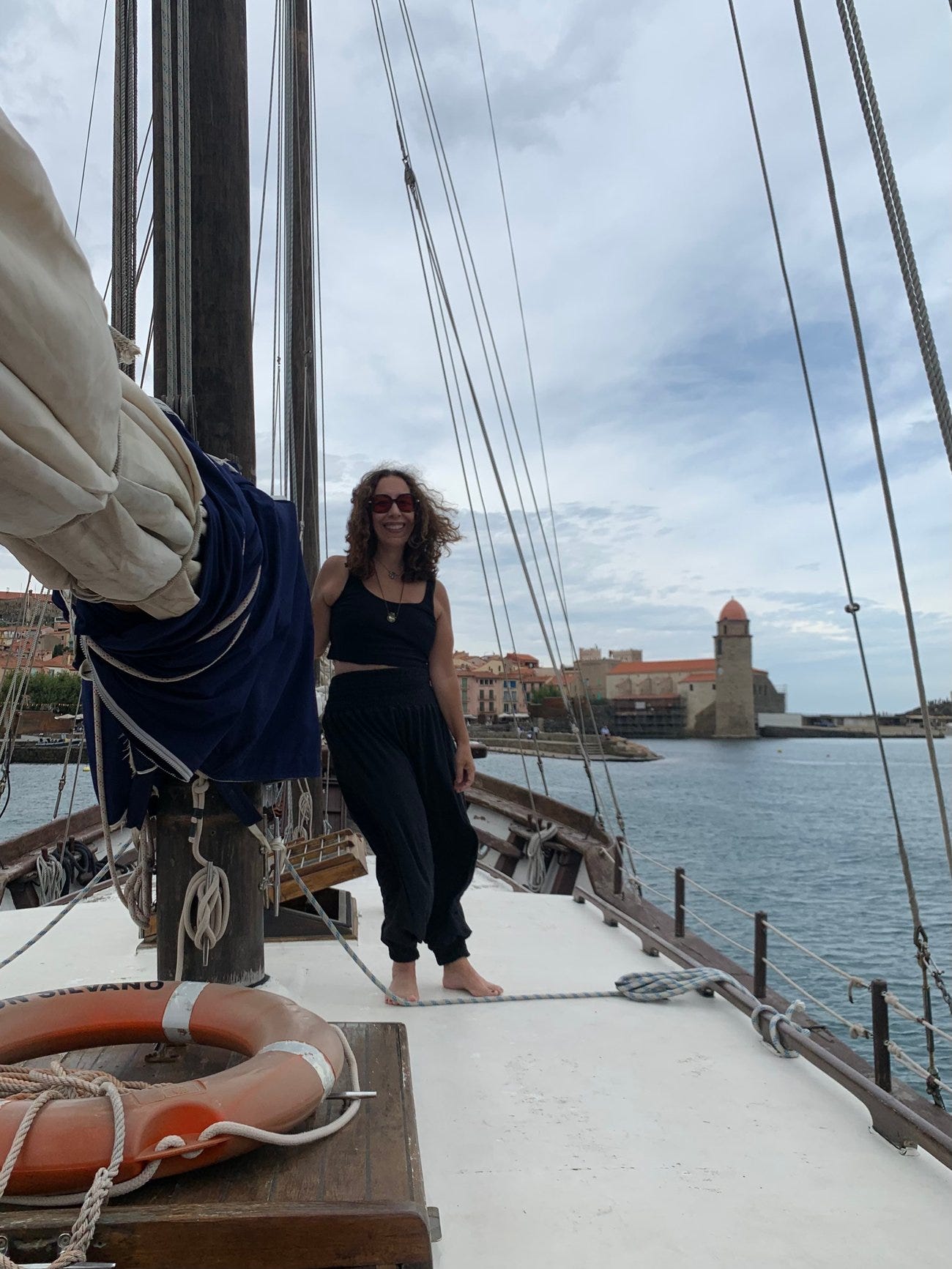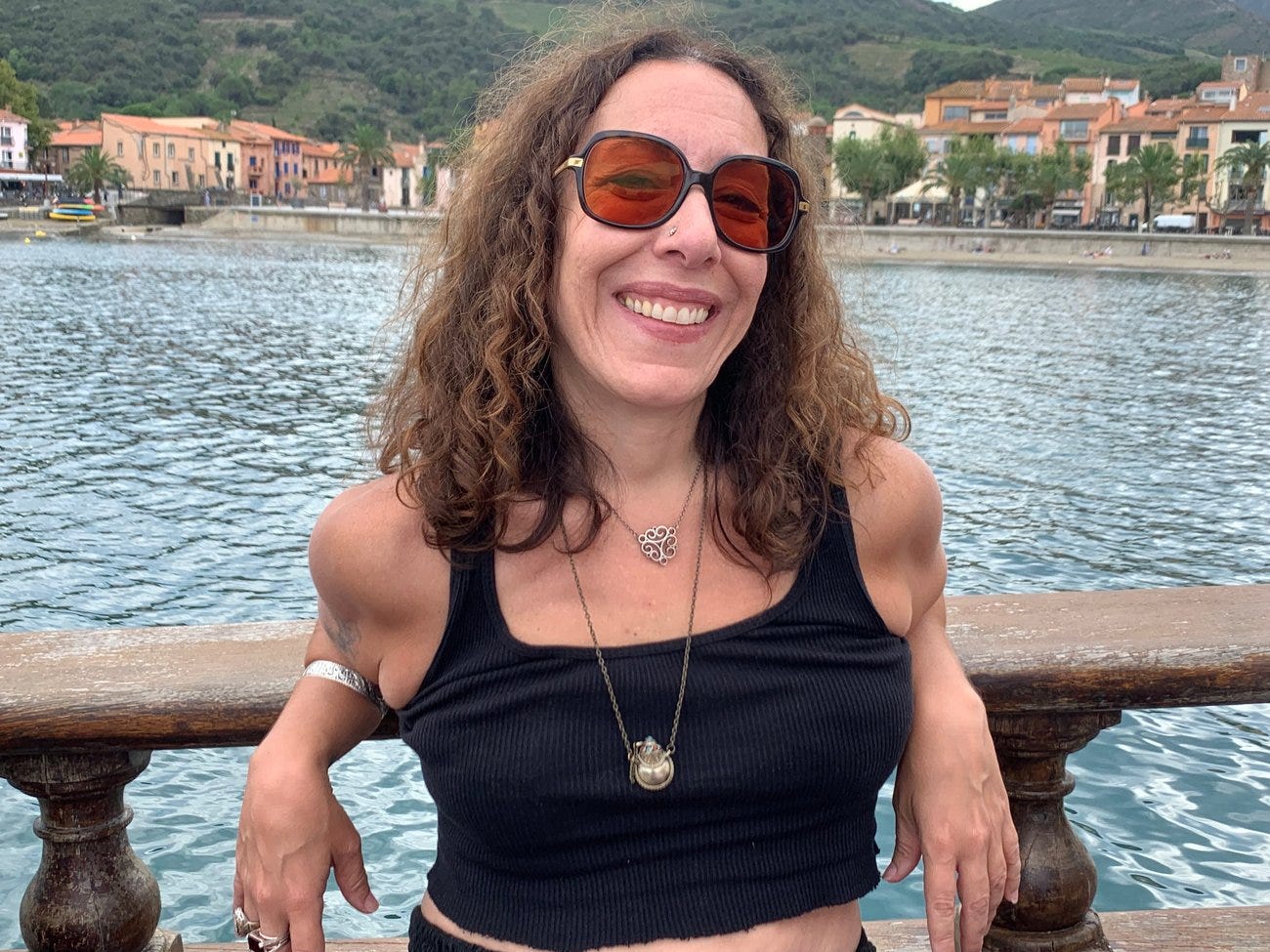Hello Circe Community!
In Collioure, I walk barefoot to and from the beach, carrying my sandals in my bag. The stones of the narrow streets are wide and flat and miraculously cool even in the sun. My host, Karen Karbo, lives only about two blocks from a quintessential small town French beach: lined by cafes full of people drinking rose and eating mussels, a carousel never actually in operation looking on as though it might be against French law not to place one within view.
When I get to the beach, I spread my towel and read Giovanni’s Room and even go into the water—a thing I can rarely be found doing in the States—which is slightly chilly, but like bathwater compared to the Pacific Ocean beaches of Los Angeles, where I was last on a beach. When I’m done because the sun is fading—weather changes quickly in Collioure—or because I’m taking part in some kind of (fabulous) organized activity like wine-tasting that Karen and her husband, Jerrod, have organized, I carry my book and my towel back up the winding Rue du Soleil to my apartment, still without shoes. Mostly, the Rue du Soleil is quiet, and I pass at most a few people on my way up the inclined streets, but at first, I am mildly worried one of the townspeople will notice that I’m shoeless and give me a witheringly disapproving French look...
When this happens neither on the way to the beach nor on the way back, the next day, I don’t bring my shoes.
When, still, I fail to be reprimanded, I take to walking all the way to the town’s main square barefoot, and when—even then—the only consequence of my actions is that the ground around the fort has a few spots with small pebbles that poke me—I make this walk not only barefoot, but with a glass cup of Muscadet I sip from occasionally, the way moms at my older daughters’ elementary school sometimes walked to the school playground for drop-off still holding coffee mugs in hand.
I am here for one week.
Collioure is an elegant small town—the room in Hotel des Templiers where workshops are held boasts artwork on almost every inch of wall space and a rather alarmingly casual case in which an original Picasso plate is displayed. The town is so rich in art history that all over town are empty silver frames on stands through which you can look and see the view depicted in famous paintings. Everyone—from Karen and Jerrod’s British neighbor, who owns a small dog called Trouffe who seems to be something of a town celebrity, to our own retreat members—is exceptionally well-groomed.
So, I don’t know what about the town brings out the feral in me; why I’m walking everywhere shoeless and why, after one botched attempt to blow out my hair amidst the humidity, I just stop washing my hair entirely and let it coil, spiral, and frizz at will. I don’t know why I spend a day in one of my daughter’s cut off black tank tops, when the last time I wore a so-called “crop top” in the United States I was twenty-eight. To be clear, I am not usually a person who wanders around with a glass of booze in public, even in New Orleans, where doing so is as ubiquitous as the carousel overlooking the beach is here. All I know is that it’s been some time since I’ve felt this unencumbered—this free.
Too free to stay inside the (gorgeous) Airbnb where Karen puts up her guest writers, too free even for its balcony that makes my heart soar and from which I can see the Pyrenees in the distance—a balcony so picturesque that I might blissfully sit on it all day, but here find myself using primarily to hang wet towels and swimsuits because I’m so compelled to wander. Too free even to write, which is what I ostensibly came here to do given I’m only required to teach twice and give a reading the duration of the week, and otherwise can do what I please.
One day, walking alone in Collioure, I catch an image of myself in a shop window and begin to laugh aloud. I can’t say quite why, but it has something to do with reaching across time and remembering a former version of myself—a young woman I often think of as so far removed from my current life that she is like a photo in someone else’s album; a girl I used to know. You know that girl...most likely, she lives inside you too.
But suddenly, in the shop window, you might say I...remembered myself.
I remembered what it felt like to be in my skin before it was the skin of a mother or a wife or even before writing became anything like a “profession” and was my own secret passion since the age of four. I thought briefly of a line from an Eagles song that used to play on an endless loop at The Latchmere Pub in London, where I worked tending bar after college: “You’re still the same old girl you used to be.” The line is from “Lyin’ Eyes” (I’ve passed through my own lying eyes phase too, though it is thankfully well in my rear view now), and I could abruptly feel myself, behind that old wooden bar, the jukebox that seemed to have nothing but this Eagles song and “Almost Hear You Sigh” by the Stones, the smell of the rag I used to wipe down the bar, the exact stools of all the regulars—exclusively male, mostly on the dole—and the taste of the potato salad we served with lunch that made up the bulk of my diet in those months. I remembered the feel of my formerly-blond hair that was usually loose and curly or piled on top of my head, and the perpetual black sweater I wore over almost everything...not unlike the black sweater I wore on the plane to Collioure, the sleeves from a buttondown shirt beneath flapping over my wrists just as shirtsleeves always have. I remembered something elemental and unchanging, some kernel of Me-ness, that has survived every stage of my life—that has outlasted even certain body parts and joints that are no part of me. But my innate tastes, core disposition, and passions remain: how happy a book on a beach or balcony makes me. How much I love the feeling of my bare feet on stone. The electricity in the air when I’m in a place I’ve never seen, and the way I vibrate inside when struck by beauty.
The peace I feel when utterly removed from any internal pressure to be what others “expect” me to be (do they even? Or is that just a story I’m telling myself?)—utterly removed from people-pleasing or micromanaging. When I can’t be in control of much of anything...
Recently, teaching in Tahoe, Lidia Yuknavitch told me that I am an “ambivert,” someone who can be either an introvert or extrovert depending on the context. On social media, in a classroom, out to dinner with friends, I often appear extroverted to the extreme, but of course anyone who spends much of her life reading and writing also has a deep and unshakable need for alone time, and this core of myself that I recognized—in the shop window, on the beach—is a self-contained little beast, happy in her own company.
As an only child growing up in an Italian and Puerto Rican neighborhood where almost everyone had a larger family and where I could not be accused of “fitting in” very well with the other kids, I often confused being alone with loneliness. I despised being alone in public because I feared I looked like I had no friends.
But in Collioure, I took myself to lunch alone at the café watched over by the carousel—a thing I have perhaps not done since 1998 when I was living in Amsterdam and my first husband was often away on business. Why? Was I under the impression that I would still feel as I did as a girl or a young woman: that all eyes were somehow on me, judging me, wondering why I was alone and what must be wrong with me? But the feeling didn’t come.
That girl, that young woman, had yet to raise three children, to quarantine with six people and three cats. And so, for all the things I recognized, buried in myself, here was one that was gone: the only child in me is now a middle-aged woman with a big family, living in a home from which both my husband and I work, and is rarely “alone.” Here, by the seaside, listening to the intermingling of French locals and British-accented tourists, with Baldwin for company, I was happy. And—once my expectation, born of memory, that I would be uneasy passed—I was at ease.
Every evening at 6:30, Karen’s fabulous “Come to Your Senses” cohort arrived at her home for dinner and the extrovert in me emerged again. Back and forth, forth and back, again. The various incarnations of myself, ones I recognized and ones I didn’t.
On our last night of the retreat, I even participated in karaoke...a thing absolutely no former incarnation of myself would have done. In Chicago, our band, The Hitchcock Brunettes, recently participated in a Joni Mitchell tribute night where I sang “Carey” and “A Case of You”—but we played Mitchell in a lower key; we did Mitchell as garage rock meets alt-country-punk. For karaoke, the music was the original dulcimer with Mitchell’s open-tuning and ethereal voice, and I botched it comically and hideously. If the old-me would not have even participated in karaoke, she would even more so have died on the spot if she did so badly. She was hard on herself, that Me. She did very little unless she could be assured of doing it well. She avoided things that might provoke embarrassment, suffering from what my ex used to amusingly call an “inflated sense of dignity.” She believed embarrassment a near-fatal disease.
I was surprised. Bombing at karaoke was funny, was embarrassing in a way that was weirdly almost delightful. How seriously that former Me had taken herself. What different standards she held herself to than she would hold anyone else, even someone she barely liked.
And so, I found myself laughing again, with the opposite impulse of that of seeing myself in the shop window. Now, I barely recognized myself at all! How had it not occurred to me that maybe, after cancer, after nursing my parents to their deaths, after a painful and contentious divorce, after All The Things of adult life, my core now understood that there are far worse things than not being a karaoke star? How had I failed to notice that embarrassment was no longer—even remotely—my greatest fear?
In a strangely fitting finale, on the day of my departure from Collioure, Jarrod offered to ride me to Perpignan—where I was to take a bus to Barcelona to meet my two oldest friends—on his motorcycle. Part of the ride was on winding roads, the other part on a highway where driving 80mph feels more like driving 250. For anyone who has ever read my third book, the 2014 novel A Life in Men, my terror of high winding roads—and of being driven by men on anything from a motorcycle to a scooter—is well-documented. And yet, when Jarrod suggested taking the bike, I was so excited I almost jumped up and down. Jarrod is an extremely experienced rider and he outfitted me for safety—not just a helmet but a leather jacket and gloves. He stored my things in side compartments and strapped my luggage to the back and we were off, me gripping his jacket with my too-big gloves, waiting (surely it would arrive any second now) for the terror, for the What the hell was I thinking? But it didn’t come. The wind was so ferocious that day I could hardly hear a word Jarrod said, but it didn’t matter. I was exhilarated, euphoric. We missed my bus by ten minutes but quickly found me another, and off I went, my headphones in my ears as the bus rolled through the countryside, listening to songs the former Me had not yet heard and would never have expected would reverberate inside me like echoes of my own life.
In glorious Barcelona, I proceeded to not-write and not-work even more. One of the friends I was with used to live in Barcelona—I’d visited him there in 1995 and we’d traveled there together in 1998—and we both remarked on the ways in which the city was so like itself and yet so changed. As, I suppose, he and I were as well. Like the fifty-five-year-old me who is both “the same old girl you used to be” and someone and something else entirely, who I will keep discovering until I shift tenses.
Or, as my Circe partner Emily would call it, the both/and. Not the either/or, but the multitudes of a life: the changes, the constancies. We all have them, or rather I might venture that if we don’t, we are living too safely, with too much fear of not being the Queen of Karaoke.
What would happen if we let go of [insert your biggest fear here]? Who might we remember, and who might we become?
Now, back in Chicago, overjoyed to be reunited with my husband and my youngest child, I’m remembering to reach through time and hold my hand out to the parts of myself forgotten along the way. Here, on the brink of yet more change, of moving out, within the next year, of the home I’ve occupied for a quarter century, the city that’s held me for forty-five of my years, I’m excited for yet more recognitions and discoveries. I wonder what I’ll find.
Love—
Gina, Emily, and Heather






Thank you for this! Reminding us all about the various versions of “me” that are within us. That we can honor and respect them and not be trapped with them. That no matter our age, we can leap into a new me, or is it simply embracing a new me that was always there, but forgotten?
Gorgeous Gina! This stage of life coming fully into ourselves is wondrous and glorious. So much better than ever. 🦋